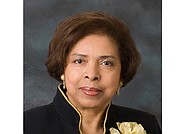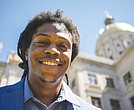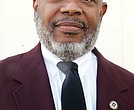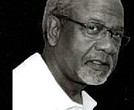A moral demand
Dr. E. Faye Williams | 6/21/2019, 6 a.m.
I had the opportunity recently to participate in the Poor People’s Campaign: A National Call for Moral Revival. Along with Jerry Paris, general manager of WPFW-FM 89.3, and the Rev. Graylan Hagler, I was invited to co-anchor the program carried by WPFW-FM radio.
The campaign is based on fundamental rights that all human beings should enjoy. The Rev. William J. Barber II of North Carolina is the leader with the moral authority to conduct this action.
At the meeting and march to the White House, Rev. Barber spoke to a large, enthusiastic and diverse crowd at the New York Avenue Presbyterian Church in Washington.
Prior to the meeting in Washington, the campaign had reached out to more than 30 states, meeting with thousands of people, witnessing the strength of their moral courage. The group collected testimonies from hundreds of poor people and chronicled their demands for a better society. They’ve witnessed the struggles of the poor and dispossessed.
It has been documented how the group came to the current point. Documentation reveals the evils of systemic racism, poverty, ecological devastation and the war economy and militarism that are persistent, pervasive and perpetuated by a distorted moral narrative that must be challenged. It indicates that those who refuse to see these injustices and acknowledge the human and economic costs of inequality must be challenged.
The action in Washington was a great step toward challenging these conditions. A moral agenda was issued and I will share just a sampling of the demands the group has adopted:
Full restoration and expansion of the Voting Rights Act, an end to racist gerrymandering and redistricting, early voter registration at age 17, automatic voting registration at the age of 18, early voting in every state, same-day registration, enactment of Election Day as a holiday with a verifiable paper record, as well as the right to vote for currently and formerly incarcerated.
Statehood, voting rights and representation for the more than 690,000 people in the District of Columbia.
Implementation of federal and state living wage laws that are commensurate with the 21st century economy, guaranteed annual incomes, full employment, right for all workers to form and join unions, end to anti-union and anti-workers’ rights laws in states, equal pay wage and relief from wealth inequality.
End inequalities for black, brown and poor white people within the criminal justice system.
An immigration system that, instead of criminalizing people for trying to raise their families, prioritizes family reunification, keeps families together and allows us all to build thriving communities in the country we call home.
Particular attention be paid to data concerning First Nations, Native Americans, Alaskan Natives, LGBTQIA and disabled people regarding poverty.
Change in the current poverty standards to get an accurate assessment of who is poor — based on access to decent and adequate housing, education, health care, water, sanitation and public utilities, child care, as well as income, savings and debt, and social welfare — and that’s made widely available to all.
Fifty years after Dr. Martin Luther King Jr. and the 1968 Poor People’s Campaign declared “Silence is betrayal,” the group’s message is “We are coming together to break the silence about the interlocking evils of systemic racism, poverty, ecological devastation, the war economy and our distorted moral narrative …
“If silence was betrayal in 1968, revival is necessary today. We’ve come to remind our nation what truths we hold to be self-evident and what values we hold dear.
“We draw on the histories of resistance … and the power of the blood that has been shed through generations of struggle. We loudly proclaim that we will move forward together, not one step back!”
These declarations are something about which all of us should care about and want to be involved with. See www.poorpeoplescampaign.org/demands for more information.
The writer is president of the National Congress of Black Women.








